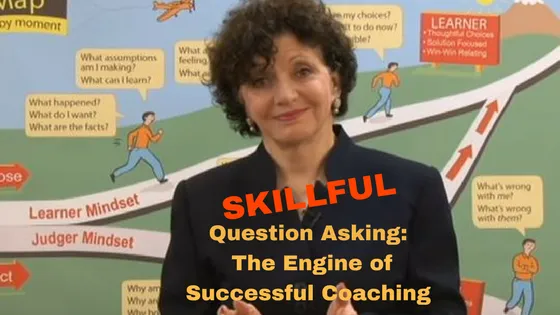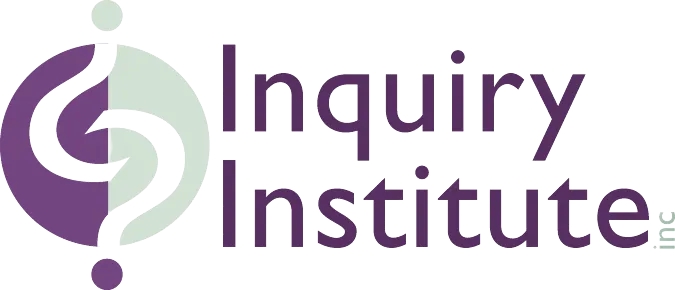Blog

Skillful Question Asking: The Engine of Successful Coaching
Coaching is a powerful vehicle for optimizing performance, personal mastery, and results. Because coaching has proven to be so effective, many major corporations invest in internal coaching and mentoring programs, usually for executives, leaders, and managers.
The practices of independent coaches also are flourishing, empowering clients both professionally and personally. In both arenas, skillful question asking is the engine that drives coaching, from building relationships, to gathering information, setting goals, making interventions, and creating action plans.
This article covers both theoretical and practical ground in highlighting the importance of question asking for coaches, clients, and the coaching profession as a whole. The focus is on both interpersonal and internal questions. In addition, the uses of the Mindset Model of the Learner and the Judger, both in coaching sessions and as underpinning of question-centered psycho-education in coaching, are explored. Finally, we discuss coaching and questioning practices in the context of learning organizations.
Coaching is a form of personalized, supported learning and development undertaken in the context of the accomplishment of goals, either professional or personal. In the corporate world, the request for coaching usually originates from someone in the organization rather than the potential client, such as a manager or supervisor, often as the result of a 360˚ assessment. Most referrals to coaches in independent practice, on the other hand, are self-generated. While the difference in the origin of the referral creates different expectations and challenges for both coach and client, the questioning processes described here can be successfully utilized by either corporate or life coaches.
What Makes Questions Important in Coaching?
Virtually every function that occurs in a coaching session is grounded in asking questions. Questions are fundamental for gathering information; building and maintaining relationships; learning, thinking clearly, creatively, and critically; making requests; and initiating action. Asking questions is also fundamental for resolving conflicts and breakdowns, making decisions, solving problems, catalyzing “out-of-the-box” thinking, listening fully, and managing individual and organizational change. Furthermore, success at tasks such as goal setting, staying on track, and strategic planning are all dependent on skillful question asking. Each of these subjects, and perhaps all of them, may be addressed during the course of a coaching engagement.
Because questions are used so frequently and in so many different ways, many coaches have not fully recognized the existence of a systematic, comprehensive method to master their usage. Moreover, even when there is an awareness of the importance of questions, it is often limited, incorrect, or simplistic. For example, many coaches consider open-ended questions (“How are you feeling?” “What are your opinions about that memo?”) as more important than close-ended questions (“What time is it?” “Do you want to go to that meeting with me?”). However, neither type of question is intrinsically “better” than the other; it depends on the context and any particular goals within it.
The questions are always contextual, depending on the phase of the coaching session and the purpose, or intended result, of the question. Therefore, coaches could ask themselves, “What do I want my question to accomplish?”1 In addition, another category of questions, facilitative ones, combine features of both open and closed questions, and are among the most useful for successful coaching.2 In other words, coaches need to know what kinds of questions to ask when, as well as how to design and deliver questions. For these reasons, coaches need to learn the principles as well as the practices of skillful question asking.
Understanding the principles of question asking begins with appreciating that questions are usually the most influential and creative aspect of speaking, thinking, and listening. It is questions, far more than statements, that stimulate new possibilities and new openings for action, while ineffective or neglected questions often result in detours, missed goals, and costly mistakes. Such results occur because questions program the form and direction of answers, even if the questions themselves are not discernible.
Not only does the quality of an answer depend largely on the quality of the question, it is not even possible to get the best answers without the best questions. In addition, breakthroughs in thinking depend on new provocative questions. Put differently, paradigm shifts occur when a question is asked inside a current paradigm that can be answered only from outside of it.3 For example, prior to the invention of computers, the question, “Can you have that inventory report to me in one minute flat?” would have been unthinkable.
The coach’s most challenging job is to catalyze clients’ ability to see new possibilities and take effective new actions. Only new questions can call for new answers. It is literally the case that, “A question not asked is a door not opened.”4 That door is first in a client’s mind – and the key to open that door is often the coach’s recognition of the importance of internal questions and how to utilize this understanding for the client’s benefit.
Interpersonal and Internal Questions
Most often in considering the domain of questioning, people understandably refer to interpersonal questions, the ones we ask each other, such as the questions a coach asks clients in order to guide a coaching session. In general, interpersonal questions are the only ones most people are aware of, since these are the most obvious ones we hear and use everyday. As vital as these communicating questions are, however, they represent only one part of the domain of questioning.

The other part is made up of internal questions, the ones we ask ourselves. Most people are only dimly aware of the existence of their internal questions, despite the fact that these questions virtually program our thoughts, feelings, actions, and outcomes. Moreover, most of us are unaware of how pervasive or influential these internal questions actually are.
To take an everyday example, the behavior of getting dressed in the morning is guided by a series of internal questions that we may, or may not, be aware of asking. Such questions might include: “Where am I going today?” “What’s the weather supposed to be?” Who’s going to be there?” What will be comfortable?” What’s appropriate?” and even, “What’s clean?” The clothes we select represent behavioral answers to such questions, even if we remain unaware of the internal, decision-making questions that preceded and generated those behaviors.
A primary reason these internal questions are so important in coaching is that they are the basis of how human beings think and make decisions. That is, internal questions are at the source of both effective and ineffective decision making. If a decision as simple as what to wear is generated by so many internal questions, consider what kind of interrogative decision-making process must be involved in more complex decisions, such as choosing a career or whom to marry.
In this sense, for optimum impact, a coach would best be aware of the influence of clients’ internal queries. The coach would use this awareness, for example, to help clients discover personal questions that might be impeding progress. This would serve as the basis for designing new, productive questions that would facilitate clients’ ability to reach their goals.
In addition, these internal questions actually shape the course of external, interpersonal dialogues. Both verbal and nonverbal behavior can be seen as answers to preceding internal questions. In other words, what we say to others is simply an external voicing of the answers to questions we have formed within ourselves.
Optimally, coaches would be aware of their own internal questions while working with clients. Either in person or on the telephone, coaches guide their sessions primarily through a series of interpersonal questions. In the background of these interventions are the coach’s own internal questions. Such questions might include: “What will be most helpful now?” “What could be keeping my client from moving ahead?” “What else needs to happen here?” In other words, coaches’ interventions represent answers to their own internal queries about the progress of the session, and what needs to be accomplished to bring it to a successful conclusion.
The Mindset Model of the Learner and Judger
Our mindsets frame the way we see the world, and simultaneously program what we believe to be our personal limitations as well as our possibilities. Therefore, our mindsets also define the parameters of our actions and interactions, and affect, either explicitly or implicitly, outcomes in any area of focus. A practical way to think about mindsets is to imagine that they are defined by particular kinds of internal questions, since the questions we ask ourselves, whether or not we’re aware of them, do indeed tell us what to pay attention to, what to expect, and how to behave.
Distinguishing the Learner and Judger mindsets provides a way to observe, categorize and understand thinking (or internal dialogue, including internal questions) as well as behavior. The model also helps individuals make skillful cognitive, behavioral, and relational choices based on their observations. The cognitive ability and proclivity for self-observation is called “formal operations” by developmental psychologists. It is fundamental for exercising those most mature and fundamental requirements for effectiveness: awareness, choice, and responsibility. The Mindset Model of the Learner and Judger, with its focus on internal questions, therefore has implications for the orientation, attitudes, and skill sets of clients as well as coaches.
The illustration of the Learner and Judger mindsets is summarized from a more extensive version that appeared in an earlier work.5 The two columns comprising the top two-thirds of the chart describe the qualities and characteristics of the two distinct mindsets. At the bottom of the chart are sample questions that characterize each mindset and that lend muscle to clients’ possibilities for change. While the list of characteristics empowers clients’ ability to observe and understand themselves and others, the questions provide a practical tool for making changes effectively and swiftly.

Ultimately, the higher the quantity and quality of Learner questions asked, the more that coaching progress can be assured. Questions typical of the Learner mindset are responsive to life’s circumstances and lead to thinking objectively and strategically, seeking and creating solutions, and relating in a win-win manner. Typically, Learner questions are optimistic, and presuppose new possibilities, a hopeful future, and sufficient resources.
Conversely, questions typical of the Judger mindset are reactive, and lead to emotional thinking and behavior. These kinds of questions, which are usually automatic, lead to negativity, limited possibilities, and focus more on problems than solutions. Such questions result in win-lose relating, or operating in what may be termed an “attack-or-defend” paradigm. The Judger, or judgmental, mindset, may be focused either internally or externally; that is, either on oneself or on others (including one’s manager, team, organization – or spouse). Whichever the focus, a Judger orientation results in denying responsibility, searching for blame, and impeding progress.
The problems and frustrated goals that clients bring to the coaching relationship are generally circumscribed by a Judger orientation, even though these same individuals may operate from a Learner mindset in other areas of their professional or personal lives. Since solutions and growth are most reliably available from the Learner orientation, training clients to develop the habit and skill of asking Learner questions helps them resolve the issues that brought them to coaching, as well as move toward the growth and development goals they have chosen.
In other words, the Mindset Model of Learner and Judger helps clients build and reinforce their ability to observe, understand, and accept themselves and others. It is intended to train clients to become more flexible, more open to new possibilities, and less attached to their opinions and need to be right. It also strengthens their ability to be conscious of choice and responsible for their thoughts, feelings, behaviors, and outcomes.
The power of this Mindset Model lies in stimulating higher-order cognitive capacities and using this awareness to help bring about a transformative shift from the Judger position (characterized by a “know-it-already” mindset) into new Learner possibilities of thinking, behaving, and relating. While the distinction of these two mindsets is itself vital, key to the model’s practical power lies in training clients to ask Learner questions on a consistent basis. Furthermore, for the model to be optimally useful, coaches are encouraged to use it as an explicit teaching tool with their clients.
Using a Question-Centered Psycho-Educational Model in Coaching
To empower clients through coaching means more than helping them overcome obstacles and accomplish goals. It also requires training clients in developing perspectives and skills to sustain and accelerate their progress after the completion of the coaching contract. The Mindset Model of the Learner and Judger was designed as such a psycho-educational tool. Many coaching clients, including those in corporate settings, keep a copy of the Mindset Model on their desks or near their phones, and refer to it often during the day. In particular, they refer to the Learner questions, understanding that asking those questions will keep them actively on the productive, solution-oriented side of the chart.
Coaching, Questions, and Learning Organizations
An active spirit of inquiry, fueled by curiosity and operationalized into a habit of asking questions, both internal and interpersonal, is the basis of all learning. Learning takes place, for example, when we ask questions of others for eliciting information, gaining new perspectives, and clarifying information or ideas – as well as for challenging the status quo. At the same time, learning (either through reading, observing, musing, or interacting) is generated by internal questions such as: “What does this mean?” “Do I agree or disagree?” “How does this fit, contradict, or extend what I already believe to be true?” What new thinking does this open up?” “How could this be helpful?” Of course, learning, as the basis for new perspectives, skills, possibilities, and outcomes, lies at the heart of coaching. Senge introduced the concept of the learning organization in 1990, in his now-classic book, The Fifth Discipline: The Art and Practice of the Learning Organization.6 However, as he himself says, there is no such “thing” as a learning organization. Rather, this designation points to a preponderance of attitudes and skills that characterize an organization on every level, from its vision and mission statement to the daily operations of its leaders, managers, teams, and individuals. In a 1995 article, Senge and coauthor Kofman wrote, “Learning organizations are a space for generative conversations and concerted action. In them, language functions as a device for connection, invention, and coordination… What they know takes a second place to what they can learn, and simplistic answers are always less important than penetrating questions (italics added).”7
A National HRD Executive Survey, conducted in 1996 by the American Society of Training and Development, found that 90% of organizations reported either being, or aspiring to become, learning organizations.8 However, an organization cannot be worthy of this rubric if it does not actively encourage the learning of every individual, whatever his or her role. Senge notes that, “Organizations learn only through individuals who learn.” 9 Coaching is the most explicit and personal vehicle for encouraging and training individuals in transforming themselves into intentional, innovative, and productive learners. To this end, the Mindset Model of the Learner and Judger can serve as a powerful training tool for coaches to use with their clients in learning organizations.
Learning organizations, to fulfill their promise, would be comprised of Learner individuals and Learner teams, as conceptualized in this article. That is, the behavior of the organization – and the individuals and teams that comprise it – would be generated by actively engaging in Learner questions, both internal and interpersonal. Thus, a Learner orientation is simultaneously a place to “come from,” an active intention to aspire to, and a set of questioning practices to rely upon. To underscore this point, we can consider that, “Without the intentional discipline of questioning the assumptions and beliefs of its culture and operations, an organization is reactive rather than proactive, surviving rather than thriving.”10
Dilworth, an organizational theorist, write, “In the broadest sense, all organizations learn. The problem is that many organizations today are learning disabled… The key is to produce organizations that learn naturally and effectively.”11 Coaching can provide an essential key to such organizational and individual transformation. The premise of this article is that coaching itself, whatever the setting, can be optimized if coaches seriously take on the task of utilizing the practical and transformative power of questions and the mindset from which those questions are asked.
Summary
This article highlighted the critical role of skillful question asking, both internal and interpersonal, for successful coaching. It presented the Mindset Model of the Learner and Judger, which was designed both to assist coaches’ interventions during sessions, and as an explicit psycho-educational tool for clients to use on an active and consistent basis. We examined the presumption that learning organizations might further fulfill their promise by encouraging individuals to operate with Learner intentions and questions. In other words, we explored the assertion that questioning skills hold vital keys for the success of coaching clients, in organizational settings and in independent practices – and for the coaching profession as a whole.
* This article was adapted from one Marilee originally wrote for The Manchester Review in 1998.

Learn More

